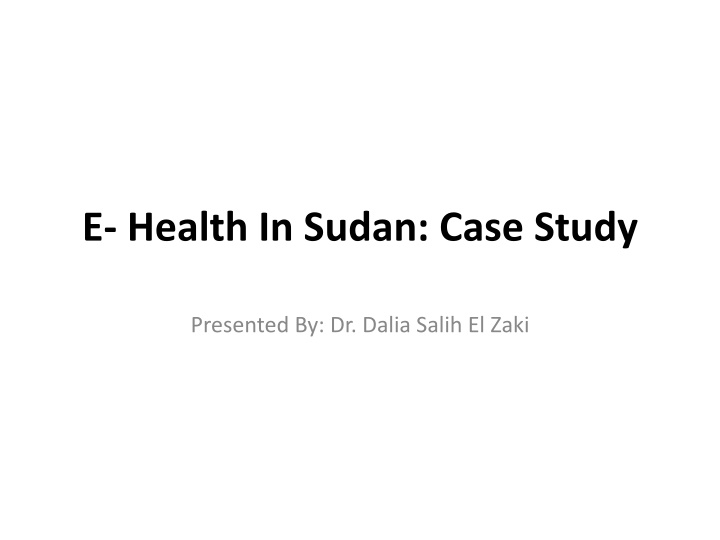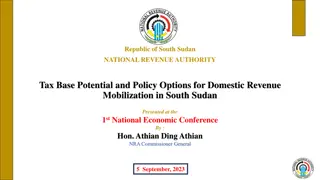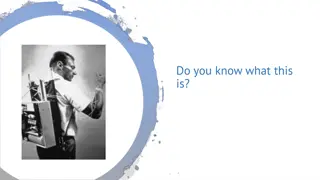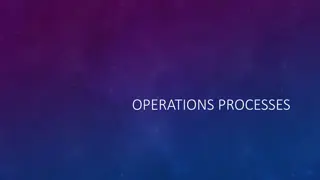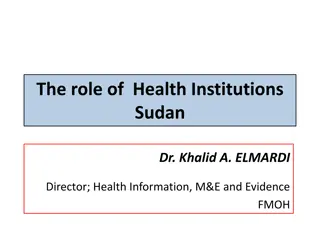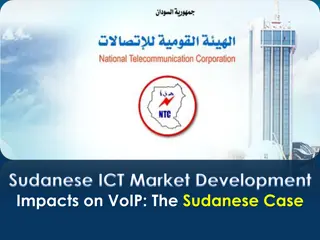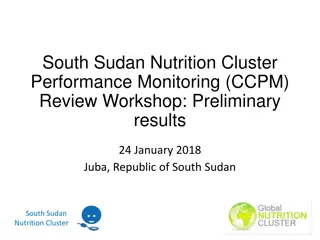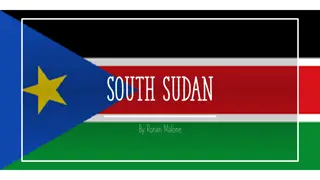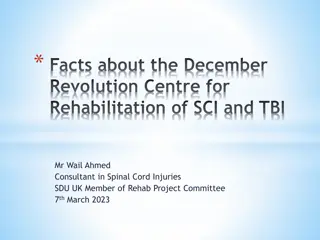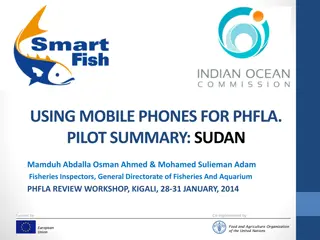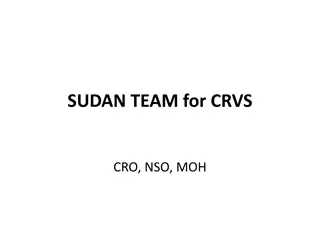Transforming Healthcare in Sudan Through E-Health Innovations
Explore the potential of E-Health in Sudan as presented by Dr. Dalia Salih El Zaki. Learn about the challenges in healthcare implementation, the advantages of E-Health, and the proposed E-health project for Sudan. Discover how leveraging information and communication technologies can revolutionize healthcare delivery, improve efficiency, empower consumers, and enhance the overall quality of healthcare management in Sudan.
Uploaded on Sep 13, 2024 | 5 Views
Download Presentation

Please find below an Image/Link to download the presentation.
The content on the website is provided AS IS for your information and personal use only. It may not be sold, licensed, or shared on other websites without obtaining consent from the author.If you encounter any issues during the download, it is possible that the publisher has removed the file from their server.
You are allowed to download the files provided on this website for personal or commercial use, subject to the condition that they are used lawfully. All files are the property of their respective owners.
The content on the website is provided AS IS for your information and personal use only. It may not be sold, licensed, or shared on other websites without obtaining consent from the author.
E N D
Presentation Transcript
E- Health In Sudan: Case Study Presented By: Dr. Dalia Salih El Zaki
Introduction Health is a very important issue, enjoying health make us happy. Therefore, the healthy citizens will participate effectively to the growth and development of the economy. Sudan health indicators are comparable to those of Sub Saharan countries, although it belongs to East Mediterranean region.
Introduction Sudan has a federal system and bicameral. Constitutes of 17 states with 184 localities. Literacy rate is 67%. Despite efforts carried out so far, the health situation still need more and more.
Introduction The opinion of authors that e- health will go a long way to remedy the health situation. So, there is a number of problems that impede the implementation of e- health in Sudan.
Introduction Thus, two questions should be answered: What are these problems? How we can overcome these problems?
What is E- Health? A state of the mind, away of thinking, an attitude and a commitment for a net worked, global thinking, to improve health care locally, regionally and world wide by using information and communication.
Advantage of E- health Reduction of the overall cost and time needed to handle tasks. Improve quality of health management. Improve health care efficiency. Empowering the consumers and customers. Education of physician through on line resources. Ethics as a new form of patient physician interaction.
Advantage of E-health Sudan stands to benefit from these and more if there is successful implementation of e-health system.
Health and ICT In Sudan The NTC is the government regulatory authority for tele-communication and internet provider. GDP account for 74.5 billion USD, 3 operators of mobile telecom, 25 million subscriber, 2 operators of landline. However, Sudan become aware for the potential of ICT especially in the health care sector.
Health and ICT In Sudan several scattered eHealth projects were found to be running in parallel with evident overlap of efforts and lack of collaboration leading to a waste of resources. Surveillance project at the Epidemic unit (FMOH), Human Resources Observatory database and the e-Health project (a hospital information system) under the E-government project.
Health and ICT In Sudan All are web-based, in the initial pilot stage and each with their own established networks and regrettably again working in isolation.
challenges To E-Health Implementation In Sudan Challenges are classified in to four components: - Political decision. - Economic status. - Socio- cultural behavior and, - Technical barriers.
Figure of component: Political Decision Economic Status E- Health In Sudan Social Behavior Technical Barriers
Role of Political Decision: Leadership and vision. Political will. Self interest. Corruption. Low expectancy of governmental organization.
Role Of Economic Status: Financial resources at the disposal of government. So, e- health cannot succeed without a well established communication net works. Limited resources represents a strong barrier, moving us back.
Social barrier low adult literacy rate only 67%. http://www.google.com.sa/images?q=tbn:ANd9GcQTCUk4j-FFwPnlmW07a66rDAic_Y8EdtCYR0vEVpXpJItDrTU1VL0OVDo
Technical barriers Lack of trained professionals and skills in disseminating ICTs based training in e-health. Shortage of medical personnel, particularly specialists.
Technical barriers Some doctors not willing to accept a change to new technology (resistance to change). Local health care workers fear this change may lead to job loss. Patients also not willing to stay away from their doctors for fear of their confidentiality of medical records.
Sudan E- Health Priorities Enhance the building of network platform for exchange health information. Accelerate the electronic Health Record Database System which contain all Sudanese records. Develop system for hospitals and FMOH.
Sudan E- Health Priorities National Health Data Dictionary (NHDD), it defines all the data elements that are used in some forms according to the international standards.
Sudan E- Health Priorities Speed up the surveillance system, implement it in rural and remote areas to make notification if patient infected by one of the notifiable diseases. Develop e-Health web portal.
